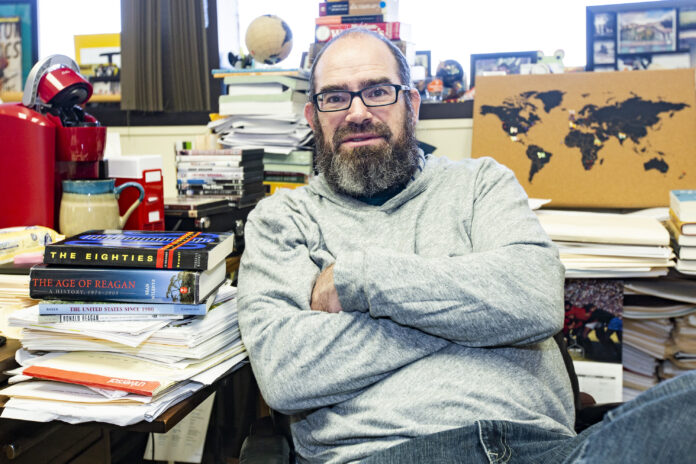
Mix a little bit of MTV with a dash of Reagan and the Cold War and you’ll have a sampling of University of Texas Permian Basin History Professor Derek Catsam’s course on the 1980s will likely include.
Catsam, who is the UTPB Kathlyn Cosper Dunagan Professor of the Humanities and Senior Research Associate and Visiting Professor (2019) at Rhodes University in Grahamstown, South Africa, said the course will start in January.
He’s working on the details now, but every class will probably start with an MTV video. Catsam wasn’t ready to teach a course talking about Obama and Trump and the 1960s doesn’t seem to have as much appeal anymore.
But he thinks more and more millennials and Gen Z people are fans of the 80s. He thought maybe this generation would be fans of the 80s because a lot of their parents would be children of that decade.
Catsam was a teenager in the 80s and this also will allow him to think historically about a period that he felt he knows a lot about, but that he needs to think more critically of.
“A lot of it’ll be a chronological political overview, but then most of it will be layering in popular culture and the things that make the 80s. The 80s are less about Ronald Reagan and Star Wars and Iran Contra, and more about MTV and greed is good and … Alex P. Keaton, and the kinds of things that people were experiencing in the 1980s. So the 80s, are as much about Madonna as they are about Margaret Thatcher in a lot of ways,” he said.
“I’m going to try to strike that balance of here’s Cyndi Lauper’s ‘Girls Just Want to Have Fun’ video” and then possibly the subtext of “Material Girl.”
He added that there is a reason that song came out when it did and was so popular and resonant.
“This whole idea of material culture being … this sort of be all and end all. But then there will also be elements of the way Americans were conceptualizing their own recent past: The Vietnam syndrome being so big in the 1980s. You have the first Rambo movie, which is this disenchanted Vietnam vet coming to this town in Oregon and being treated miserably, but then the next Rambo movie just a few years later, is like Rambo going back and single handedly redeeming the American experience in the Vietnam War,” Catsam said.
Along with President Reagan, he may include President George H.W. Bush, President Carter and Bill Clinton’s election.
The course is planned for a January start.
“I’ve been thinking about it over the summer and into the early fall. I thought about doing a course on the 90s. … A lot of the time, I’ll pick a course based on what new and interesting work is being done on that period. There’s some really interesting stuff that I think will be readable for students …,” Catsam said.
He’ll also try to run the gamut of videos such as “Video Killed the Radio Star” and “Fight the Power” and cover AIDS, the Moral Majority and abortion.
“… So I’m going to try to capture the decade and all of its kaleidoscopic glory; all of its day-glo colors …,” he said.
He probably won’t include Friday Night Lights.
“… The one thing I’ve discovered from students here is they’re actually kind of sick of Friday Night Lights,” Catsam said.
Early on, when he taught a sports class the students were sort of disinterested because they all knew about it and they lived it.
Movies such as The Breakfast Club are likely going to be part of the course.
Along with the 80s course, Catsam has a book out based on an event from 1981 called “Flashpoint” subtitled “How a Little-Known Sporting Event Fueled America’s Anti-Apartheid Movement.”
The summary on the back of the book tells the story of Springbok’s 1981 U.S. rugby tour and its impact on the American anti-apartheid movement.
“The U.S. lagged well behind the rest of the Western world when it came to addressing the vexing question of South Africa’s racial policies, and Catsam shows how the tour helped to change that. Protestors met the South African team at airports, chanted outside their hotels and courted arrests at matches even while event organizers went to incredible lengths to keep the team’s locations secret,” the dust jacket says.
Catsam said this may be why he has been thinking about the 80s in a different way.
He first played rugby at Rhodes in 1997. He had never seen a match before.
“The first rugby game I ever saw live was starting at wing for Rhodes University and within 25 seconds of my first game, I have the ball out in the wing. And within seven seconds after having the ball out of the wing, I’m a sprawled out wreck on the pitch. It was sort of a love affair. But I also saw some things even at my liberal theoretically anti-apartheid university in the first year after apartheid that” he said he didn’t necessarily always have the most progressive teammates.
Then he heard the story about the Springbok tour and thought it was a good book topic. The publisher wasn’t too sure, but they gave him a two-book contract. Next, he’ll be writing about sports and politics that’s due in 2022.
He wrote the vast majority of Flashpoint in the fall semester of last year.
Catsam said the pre-publication reviews have been good from mainstays like Publishers Weekly and Booklist.
Flashpoint is available online. This is his fourth book.
“It’s always exciting when a book comes out …,” Catsam said.



